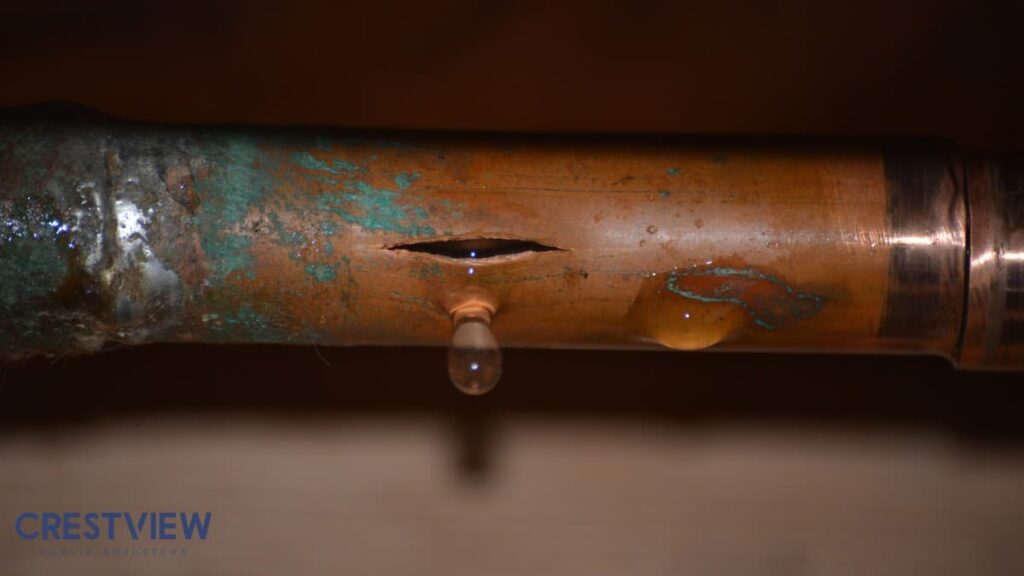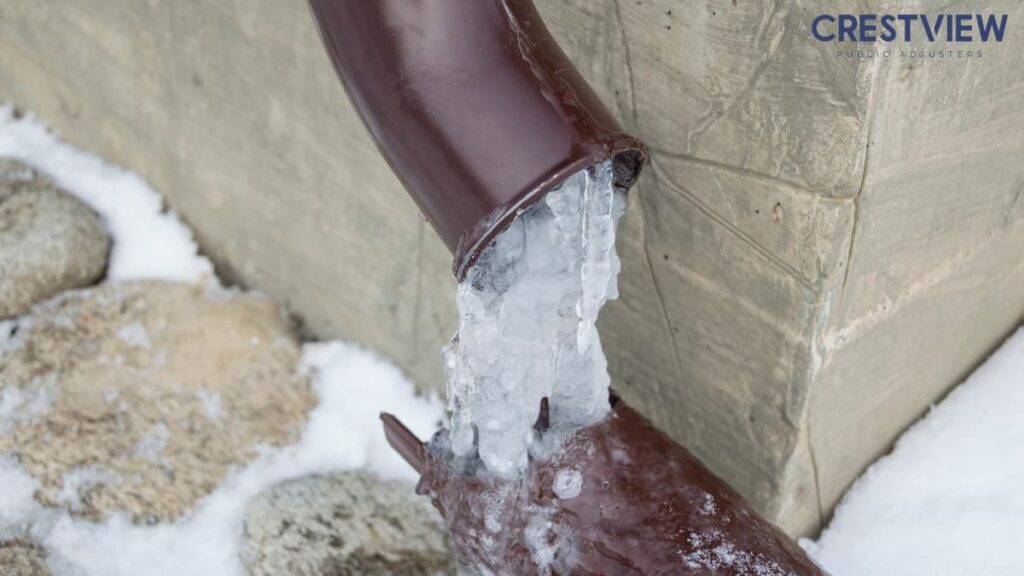Key Points:
- Frozen pipes burst when water inside expands and applies pressure on the pipe walls.
- Temperature fluctuations and poor insulation are major causes of frozen pipe bursts.
- Identifying high-risk areas and properly insulating pipes can help prevent costly damage.

Frozen pipes bursting is a nightmare no homeowner wants to deal with. But what exactly causes this costly and stressful issue? It’s more than just cold temperatures—it’s a combination of factors that can lead to disaster if you’re not careful.
Let’s break down what causes frozen pipes to burst and how you can avoid the mess.
What Causes Frozen Pipes to Burst?
When water freezes, it turns into ice, which takes up more space than liquid water. This expansion leads to an increase in pressure within the pipe. Most pipes can withstand a small amount of pressure, but as the ice continues to expand, it can reach a point where the pipe bursts. Once this happens, the water inside the pipe can escape, flooding the surrounding area and causing significant property damage.
Temperature Fluctuations
One of the primary reasons pipes freeze is rapid drops in temperature. What causes frozen pipes to burst in areas that experience these shifts? Simply put, pipes that are exposed to freezing air are particularly vulnerable. For example, pipes in unheated spaces like attics, basements, and crawl spaces can freeze when the outside temperature dips below freezing. If these temperatures fluctuate—warmer during the day and freezing at night—pipes that have started to freeze during the night can break when temperatures rise again.
Another critical factor is wind chill. Even if the temperature isn’t officially below freezing, strong winds can cause the air around pipes to feel much colder than it actually is. This can contribute to the freezing process, leading to a burst in some cases.
What Can You Do?
To avoid these fluctuations, you should:
- Insulate exposed pipes to keep the cold out and warm air in.
- Seal gaps and cracks in walls, windows, or around doors to limit cold drafts.
- Install pipe heating cables in vulnerable areas to maintain temperature.
The trick is to keep the temperature of your pipes steady to prevent the freeze-thaw cycle that results in burst pipes.
Poor Insulation
Another common cause of frozen pipes is inadequate insulation, particularly in areas where pipes are located in colder spots. What causes frozen pipes to burst when insulation is lacking? Insulation helps maintain the temperature of pipes, preventing them from coming into contact with freezing air. When the insulation is insufficient or worn down, pipes can freeze more easily.
In homes with poor insulation, areas like exterior walls or areas that aren’t heated can cause pipes to freeze quickly. Without the necessary protection, even a slight drop in temperature can lead to burst pipes in those vulnerable areas.
Steps to Improve Insulation:
- Insulate exposed pipes in crawl spaces, basements, and attics.
- Upgrade insulation in walls and ceilings, particularly in unheated areas.
- Install foam pipe insulation for quick and cost-effective protection.
Proper insulation is one of the easiest and most effective ways to keep pipes safe during extreme cold.
Blocked or Restrictive Pipes
Sometimes, a blocked or partially obstructed pipe can increase the risk of freezing. Water that can’t flow freely through the pipe is more likely to freeze in place, especially in colder conditions. When the water in the pipe freezes, the expanding ice may block the flow of water entirely, which can lead to a burst pipe.
Obstructions can be caused by several things:
- Mineral build-up from hard water, which narrows the pipe over time.
- Debris from broken down pipes or plumbing components.
- Improper installation, such as pipes that are too narrow or kinked.
Prevention Tips:
- Regularly clean and flush pipes to ensure clear flow.
- Inspect your plumbing for early signs of blockages.
- Fix any misalignments or kinks in pipes to prevent water buildup.
Preventing clogs helps avoid pipe bursts from frozen water by reducing pressure that can cause cracks or ruptures. Keeping pipes clear ensures smooth flow and reduces the risk of costly damage.
Unheated Areas in Homes
Pipes that are located in unheated or underheated spaces are especially vulnerable to freezing. What causes frozen pipes to burst in these areas? The issue arises from the exposure of pipes to extreme cold without any insulation or heating to counteract it. The longer a pipe is exposed to cold air, the more likely it is to freeze.
Places like garages, attics, and basements often have poorly regulated temperatures, leaving pipes vulnerable to freezing. Even if these areas aren’t directly exposed to the outdoors, the temperature inside them can drop significantly during cold spells.
Solutions:
- Maintain heat in unheated spaces, even if it’s just to keep pipes above freezing temperatures.
- Install space heaters in critical areas like garages or attics.
- Seal drafts to prevent cold air from entering these spaces.
Preventing freezing in unheated areas is all about ensuring that pipes stay warm enough to avoid the freeze-thaw cycle that causes bursts.

FAQ
Can a pipe burst even if it’s insulated?
Yes, even well-insulated pipes can burst if the temperature drop is severe enough. It’s important to regularly check insulation and add extra layers in areas that are more exposed to the cold.
At what temperature do pipes usually freeze?
Pipes typically freeze when the temperature falls to 20°F (-6°C) or below. However, the actual risk depends on the duration of the cold and how well the pipes are protected.
How can I tell if my pipes are frozen?
Common signs include a decrease in water pressure, strange sounds when water is running, or visibly frosty sections of pipes. In extreme cases, water may begin to leak or flood when the pipe bursts.
Worried About Frozen Pipe Damage? We’re Here to Assist!
Frozen pipes can wreak havoc, but you don’t have to face the aftermath alone. A public adjuster will help you assess the damage, file your claim, and get the best possible settlement to cover your repairs.
Contact our team of public adjusters in New York, Florida, and New Jersey for dedicated support and peace of mind through the claims process!

